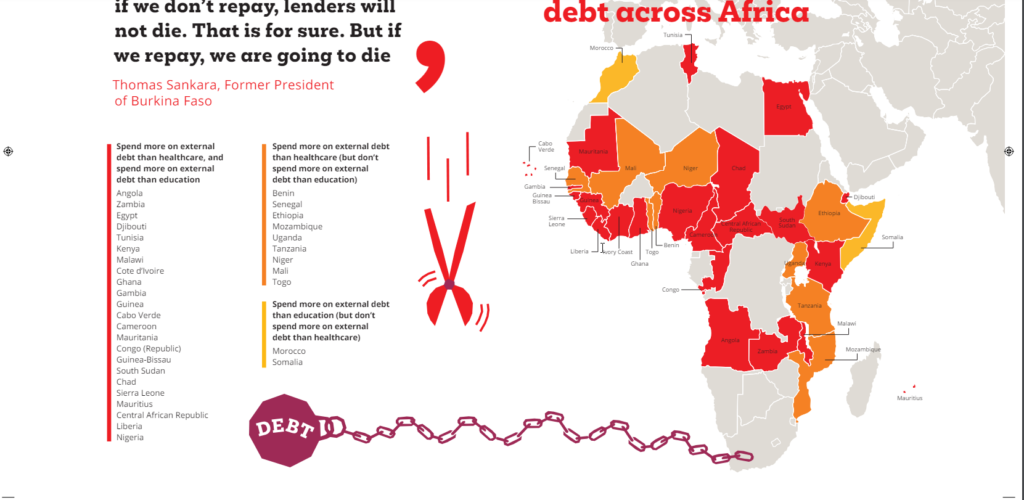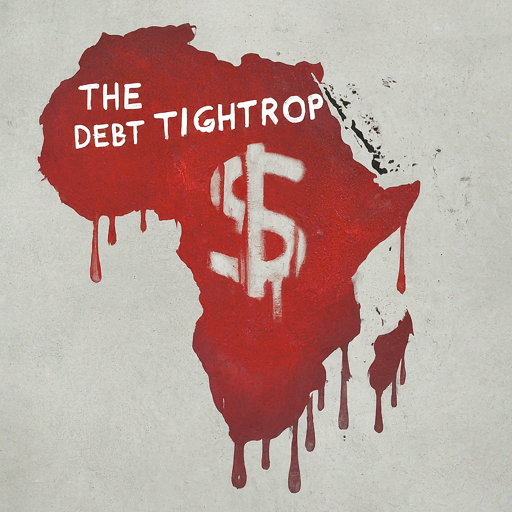Key Findings:
Debt vs. Climate Adaptation Spending:
- African countries on average spend seven times more on external debt payments than on climate adaptation.
External Debt Payments:
- In 2023, the total external debt service by African countries was $85 billion.
- Zambia, Malawi, Ghana, and Ethiopia are in default on a significant proportion of their debts for 2023 and 2024.
Government Revenue and Debt:
- External debt service consumes over 20% of government revenue on average.
- In Angola and Djibouti, external debt payments are more than 600% of public education spending.
Healthcare and Education Impact:
- Many countries’ debt service exceeds their combined spending on healthcare and education.
A recent report by Christian Aid titled Between Life and Debt, a UK-based organization working to alleviate poverty, reveals a shocking statistic: 34 African countries spend more on debt repayments than on healthcare. This prioritization of debt servicing has devastating consequences. Essential medical supplies are scarce, hospitals are understaffed, and millions lack access to basic healthcare services.
The report further highlights that debt payments have been steadily rising. The IMF (International Monetary Fund) advises that external debt repayments should stay between 14% and 23% of a government’s revenue to avoid jeopardizing essential services. However, in 2024, 23 African countries are dedicating over 20% of their revenue to debt, with some exceeding 25%. This leaves little room for investment in crucial areas like healthcare.
The scale of this inequality between Africans and the rest of the world is so great that I am not sure the world will ever forgive us for failing to deliver urgent debt
Gordon Brown, former
restructuring
Prime Minster of the UK
Christian values emphasize compassion, care for the sick, and the inherent dignity of every human life. Prioritizing debt repayment over healthcare seems to contradict these core values. Imagine a world where a nation can afford to pay off loans but not to provide basic medical care for its citizens, especially the most vulnerable – children, pregnant mothers, and the elderly. This situation raises serious ethical questions about the global financial system and its impact on developing nations.
Let’s break down the concept of external debt. Imagine a country borrowing money from international lenders, such as banks or other governments. This borrowed money is used for various purposes, like building infrastructure, improving education, or responding to emergencies. However, these loans come with interest payments, meaning the country must pay back not only the original amount borrowed but also additional fees on top.
For African nations, external debt can become a heavy burden. The report points out that many African countries gained independence burdened with colonial-era debt. Years of economic hardship and volatile global markets have further compounded the issue. The high cost of debt servicing diverts resources away from crucial areas like healthcare, education, and social programs. This creates a vicious cycle, hindering economic growth and making it difficult for these nations to break free from the debt trap.

The report raises critical questions about who truly benefits from this debt structure. While international lenders receive interest payments and repayment of the principal amount, it’s often the citizens of these developing nations who suffer the consequences. Limited access to healthcare, education, and economic opportunities perpetuates poverty and hinders overall development.
The report further explores the potential exploitation of developing nations. Some argue that loan agreements often come with stringent conditions that prioritize repayment over long-term development goals. This can limit the ability of African countries to invest in their own people and infrastructure.
The Christian Aid report urges us to move beyond a simplistic “charity” approach to the healthcare crisis in Africa. While donations can provide temporary relief, a more fundamental shift is needed. The report calls for a systemic change in debt structures and international financial policies.
One crucial step is advocating for debt cancellation or restructuring. This would alleviate the burden on African nations and free up resources for investment in healthcare and other critical areas. Additionally, international financial institutions can adopt fairer lending practices that prioritize the well-being of citizens over strict repayment schedules.
Furthermore, promoting economic development in Africa through trade agreements that favor fair prices for African exports can generate sustainable income for these nations. This can reduce their dependence on loans and strengthen their ability to fund essential services like healthcare.
Faith-based organizations have a vital role to play in addressing this complex issue. Their moral authority allows them to speak out against the injustices of the current debt structure. They can advocate for change on international platforms and lobby governments to adopt more equitable financial policies.
Moreover, faith-based organizations are often deeply embedded within African communities. They can play a crucial role in raising awareness about the healthcare crisis and mobilizing local communities to demand better access to healthcare services. On the ground, these organizations often run clinics, provide medical supplies, and offer training for healthcare workers.
By advocating for systemic change, raising awareness, and supporting healthcare initiatives, faith-based organizations can be a powerful force for positive change in Africa.
The situation may seem bleak, but there is hope. There are ongoing efforts to address the healthcare crisis in Africa. International campaigns are advocating for debt cancellation and fairer lending practices. Faith-based organizations and NGOs are tirelessly working to improve access to healthcare services on the ground.
You too can be part of the solution! Here are some ways you can contribute:
- Raise awareness: Share information about the issue with friends, family, and on social media.
- Contact your representatives: Urge them to support policies that promote debt relief and fairer trade agreements for African nations.
- Support faith-based organizations: Donate to organizations working on healthcare initiatives in Africa or volunteer your time and skills.
By working together, we can advocate for a more just and equitable global financial system that prioritizes the health and well-being of all people, especially those in developing nations struggling under the burden of debt. Let’s ensure that doctors in Africa no longer face the agonizing choice between treating the sick and paying off crippling debt. Together, we can create a future where healthcare is a right, not a privilege, for all.





